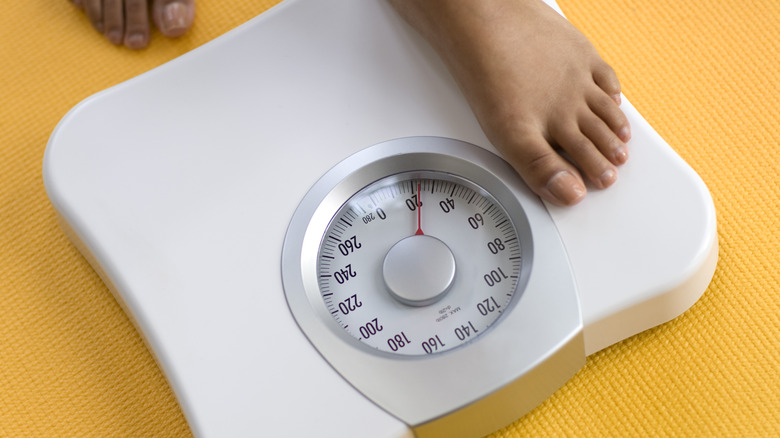Here's How Much Your Organs Actually Weigh
Shame, panic, relief — the number on a body weight scale can trigger various emotions. According to a 2019 survey conducted by Cleveland Clinic, 74% of Americans are concerned about their weight, and some of the concerns may be related to social pressure. Generally speaking, weight management can play an important role in physical health. For example, moderate weight loss may improve blood pressure, cholesterol levels, and blood sugar, while lowering the risk of some chronic diseases (per the Centers for Disease Control and Prevention).
But what really goes into the number on a scale? According to Healthline, water accounts for over half of body weight, though this ratio can vary depending on sex and age. Generally, women and older adults hold less water weight.
Many weight loss plans, like the keto diet, emphasize burning fat to shed pounds. However, fat makes up a smaller percentage of overall body weight compared to water. Though it changes with age, a healthy range for women is between 14% and 23.2%, and a healthy range for men is between 8% and 19.7% (per MedicalNewsToday).
That still leaves several pounds, which can be attributed to the weight of several organs. Here's how much some of them weigh.
The skin and liver are among the heaviest organs
The weight of the human body and its organs can vary depending on several factors. However, a 2001 study published in the journal Forensic Science International set out to find the average weight of certain human organs.
Of the organs studied, the liver — the largest solid internal organ, according to Healthline — was the heaviest, weighing between 1,475 and 1,677 grams, on average. The next heaviest organs are the lungs, with the right lung generally weighing more than the left. One lung usually weighs between 467 and 663 grams.
The heart typically weighs between 312 and 365 grams, roughly the weight of a can of soup. Each kidney weighs about half of that, ranging between 135 and 162 grams. The spleen is slightly lighter — between 140 and 156 grams — followed by the pancreas, which generally weighs between 122 and 144 grams.
The lightest organ measured was the thyroid. Though thyroid health is crucial in regulating hormones, the thyroid only weighs between 20 and 25 grams on average, which is about the weight of a mouse. Our skin, the body's largest organ, wasn't measured in the research. However, a separate 2003 study published in Nursing Times suggests it accounts for an estimated 15% of body weight.
Next time you weigh yourself, remember the many body parts that make up the number you see. While lifestyle habits can influence the digits on a scale, much more goes into the weight of the human body.


